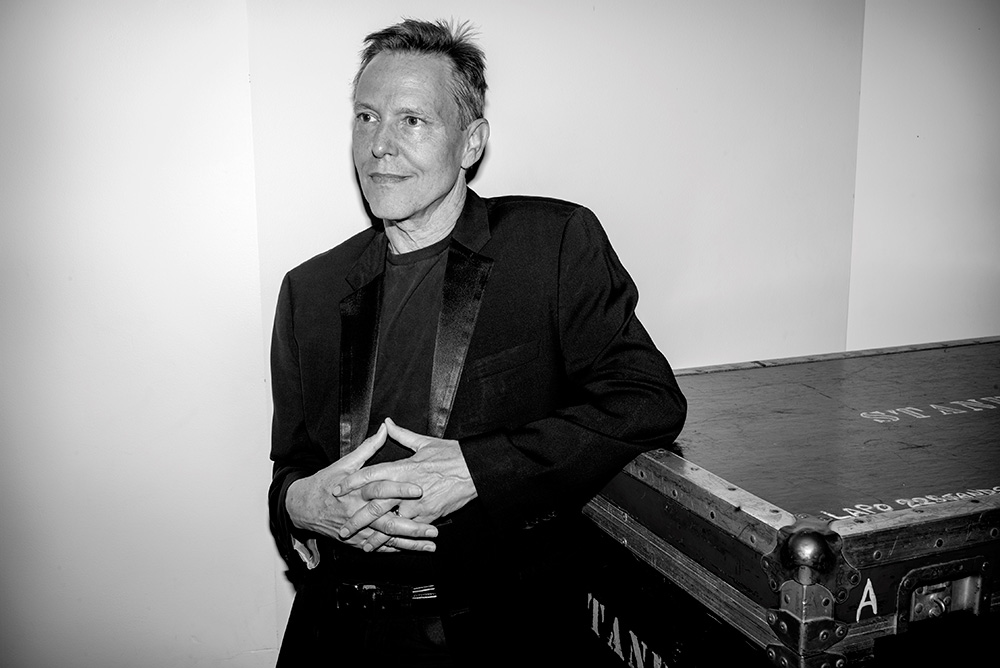
DLAR: I want to start out by talking about your longstanding collaborative relationship with Peter Sellars. He’s directed Lagrime [di San Pietro] and also Music to Accompany a Departure — you two seem like very dependable colleagues, very present for each other when needed. How did you become collaborators? How did that relationship begin?
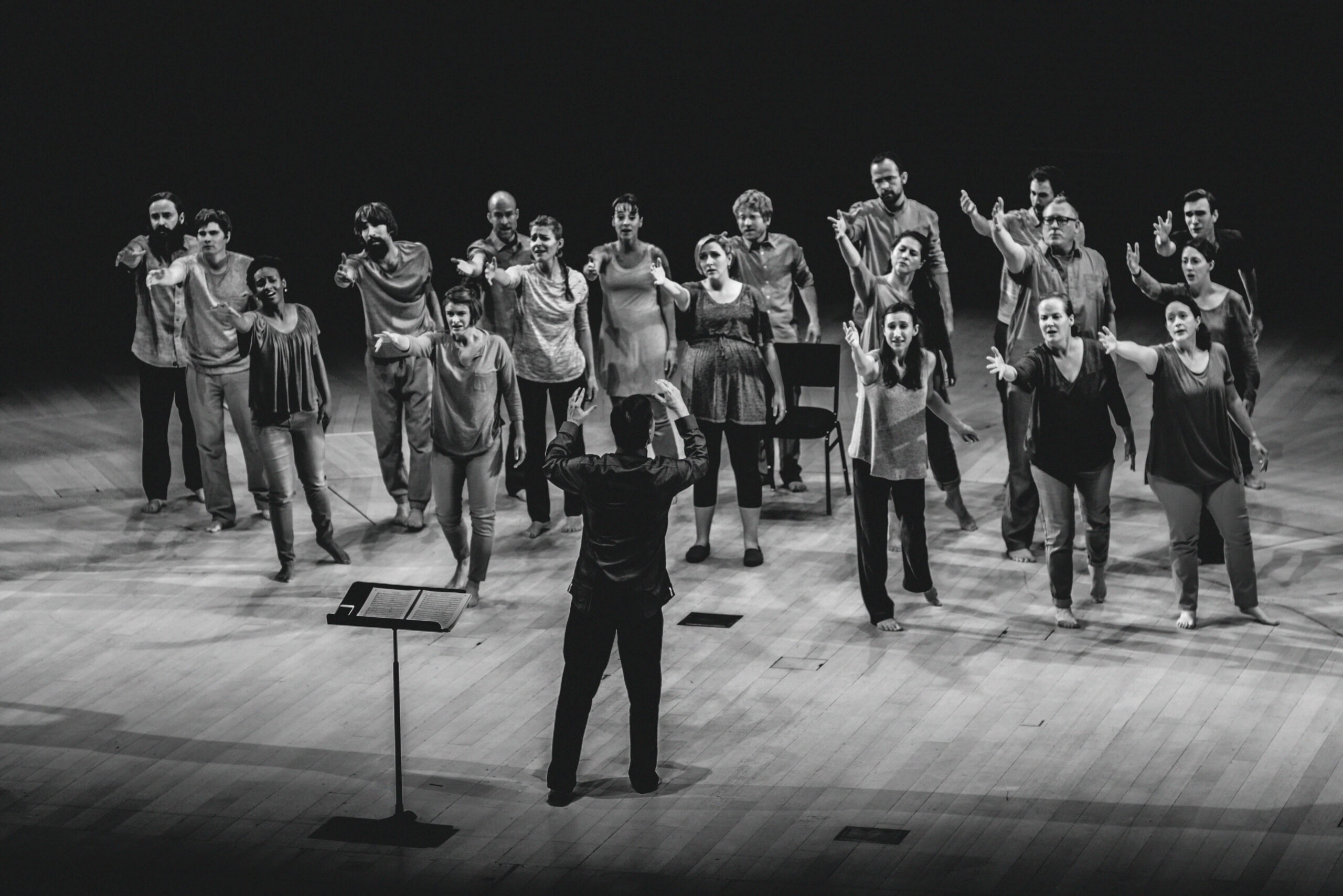
Grant Gershon: Well, it goes all the way back to 1988, which was the first time we worked together. That was when I was a pianist, and I was working at LA Opera, doing Peter’s production of Nixon in China by John Adams. I was just the rehearsal pianist on it, and of course, I had fallen in love with the piece, I just loved playing it. Peter and the cast, I think, noticed that the pianist was, like, super into it. Based on that, Peter and I became friends. Fast forward to 1995, and Peter and John asked me to be the music director for a new piece that they were writing together, called, I Was Looking at the Ceiling, and Then I Saw the Sky, so we did that, and also toured. In the meantime, Peter and I have probably worked on at least twenty different productions together. Many productions predated Lagrime and Music to Accompany a Departure. What made those two pieces unique was that the LA Master Chorale itself, as a producing entity, had engaged Peter to create a new work for us.
These were the first projects that were completely dedicated to the ensemble. In the case of Lagrime, it was really important to us that this first collaboration be entirely a cappella, and it was the first time that Peter had ever done a project that had no instrumentalists at all. It was an incredible experience, but also incredibly challenging, as you can imagine, to sustain this very complex polyphony, to sustain the drama of it, to make sure that we stayed locked in on intonation over the course of an hour and twenty minutes. These big, ambitious projects expand our universe as a choral ensemble, make us all better. More engaged with each other just on a deeper level. That’s, I suppose, both because of the intensity of the collaboration and also the fact that anytime you take something out on the road and have the opportunity to do multiple performances over a long period of time, it deepens in a powerful way.
You talk about “sustaining” — I know you mean sustaining audibly — but there’s also the question of how you sustain collaboration, given that you and Peter and the chorale are always traveling! What are some of the things that you do to stay connected or to keep the momentum going when you’re working on a piece together and you’re all moving parts?
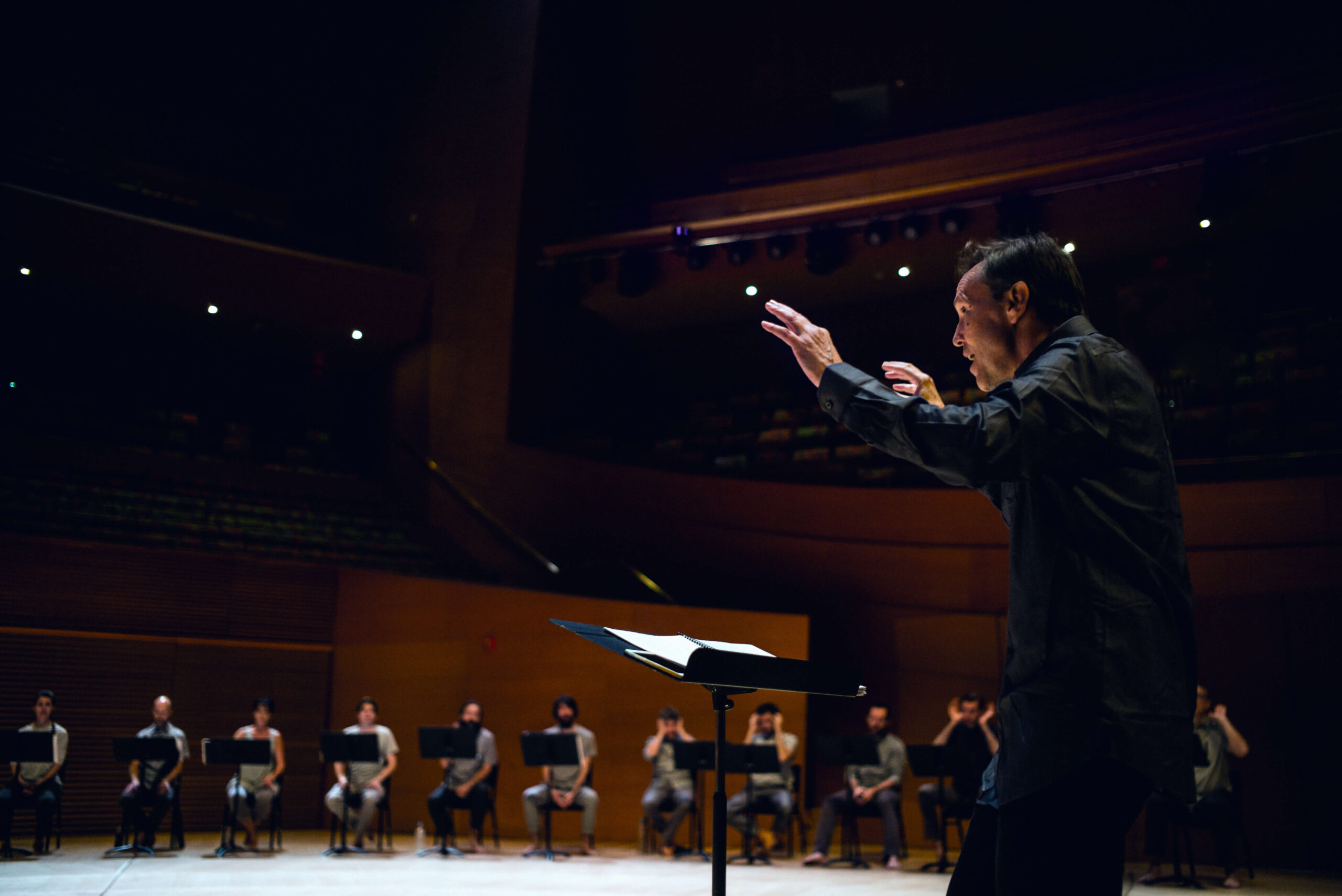
GG: Peter, as a director, is unusual in this aspect. In my experience, Peter likes to be there as much as possible anytime we’re revisiting a piece. Most directors that I’ve worked with, once they stage it and set it and there’s a premiere, they may check in on it every now and then… They’ll often have an assistant or an associate conductor remounting the piece. But, Peter really feels, and we all do, that these pieces are living and growing organisms and that they’re never set in stone, so the piece continues to develop each time that we have the opportunity to revisit it.
Even in the case of Lagrime, at this point, we’ve performed the piece over twenty-five times — it’s really deep in our bones and in the DNA of the group. Still, it’s important to come back to it and allow ourselves to be open to trying new things, to experimenting with different pacing, a different point of view in particular moments, and addressing anything that we feel maybe isn’t working as clearly as intended. That’s probably the biggest thing that sustains the relationship: we’re all open to continuing the process, and open to the idea that a piece is never finished.
Well, and I say this with love, it sounds incredibly restless. “It’s never done, we will always continue.” Do you feel like that attitude of continually working on something and thinking of it as a growing, changing thing is natural to the group? Is that something you’ve worked to cultivate over the years, or did it just happen?
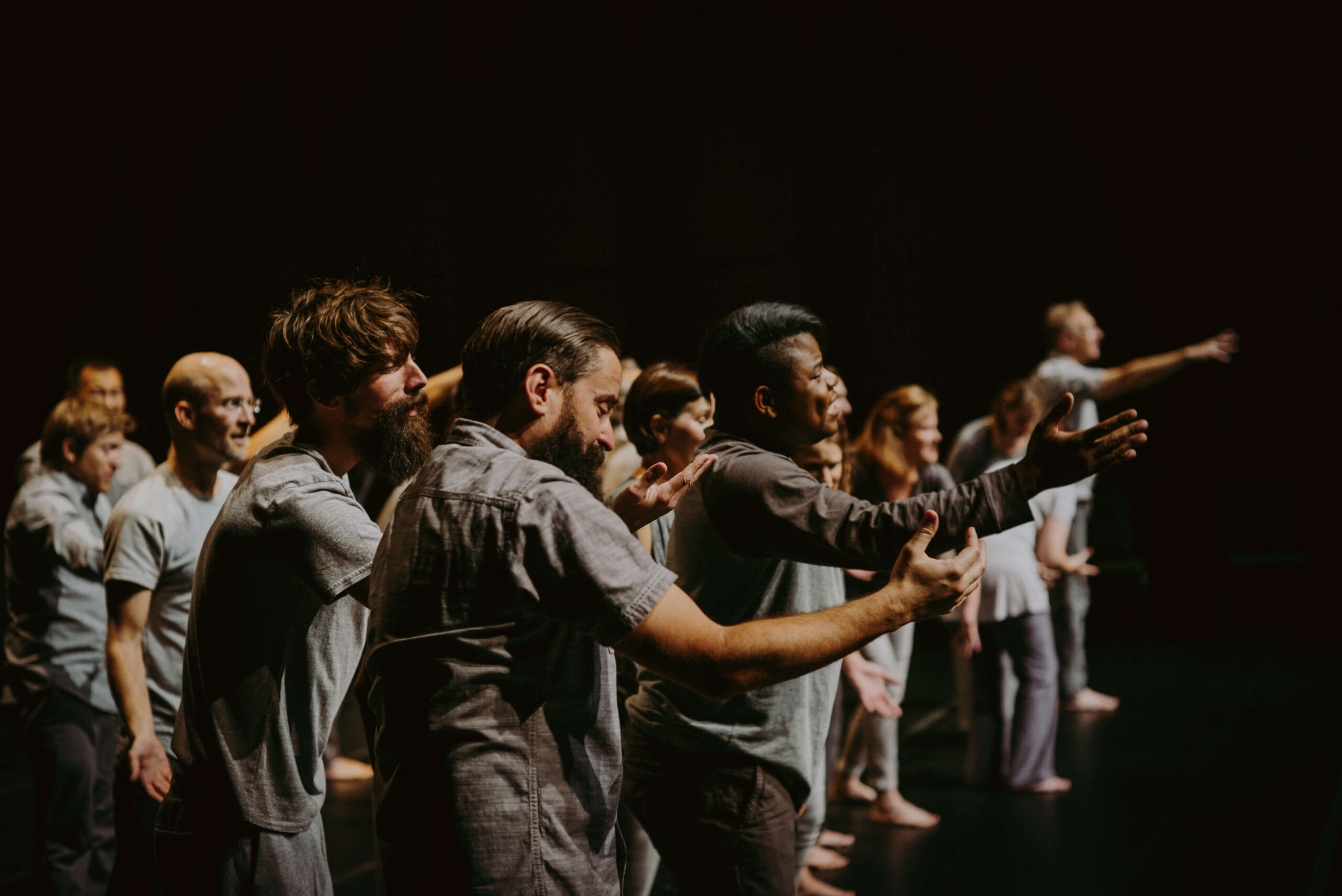
GG: I think that it is natural to the group at this point, and I think that it’s something that we’ve all cultivated over time. When we first did Lagrime in 2016, it felt like climbing Mount Everest. It was such a daunting undertaking, and were all scared. Peter himself said that if were to do this project, it would be the hardest thing any of us ever did. I thought it was hyperbole at the time, but he was right. First off, twenty-one seven-part Italian sacred madrigals of the complexity of Di Lasso. The Italian alone! All in archaic Italian. Nothing repeats musically or textually. And no one part of those seven parts of polyphony makes any sense without the other parts. They’re all strands of thread that weave together.
The process was so daunting that after we initially performed the piece and premiered it, there was a sense from some of us that “that’s done now.” We can just put that on ice. We know how it goes, we’ll just recreate this every time. Of course, as I said earlier, that’s not really the way to make art and keep it living and breathing and viable. There was this dawning realization of, “Wait a minute, we just barely got through this thing by the skin of our teeth!” It took a little while for all of us to acknowledge that the way forward is to make that commitment. Then came the realization that we were making it better, that every time we would come back to it was stronger, it was clearer, it was tighter, and it had more room to breathe (both of those things being true at once). It’s a matter of trust, and you trust that you’ve got each other’s backs. Peter is watching out to make sure that we’re taking care of people and that we’re creating a framework where everybody can do their best work.
That trust is particularly interesting to me because of how both pieces touch on division in different ways, either socio-political division with Lagrime, or physical division, with [Music to Accompany a Departure]. What was it like trying to guide and nurture your singers through these pieces when they feel highly topical? If I were in that position, I would have a hard time struggling through a work that’s talking about loss and death and mourning and grief, and then going out into a pandemic-stricken world.
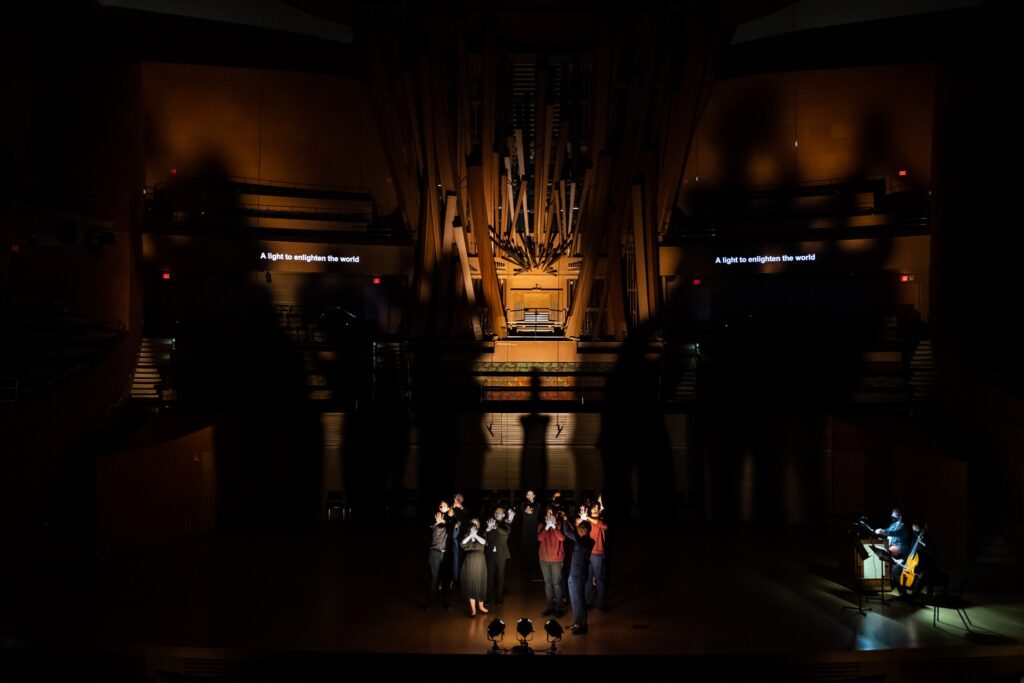
GG: In the case of the Schütz, it was really challenging to get started. Everything about that piece was so real to every one of us. Everyone in the group had experienced these kinds of losses. We had a series of musical rehearsals first, as we always do, and that was they were good and focused. When we showed up to the first staging rehearsal, Peter had set twenty-four chairs in four rows of six, facing towards a long, flat table. Peter explained to us the idea: that at different points in the piece, different singers would sing all the duets with one person as a caregiver or a loved one, and the other person at death’s door. We started, and found we just had to stop. It was bringing up so much for everybody.
So, the next time that we met, the second rehearsal, we set all the chairs in a circle, and we spent the whole rehearsal just talking — everybody sharing the experiences that they felt they needed to share with the rest of us. For instance, my father had just passed away the previous June, and I had been with him as he passed. Many of us had been in those kinds of situations. We decided together that were going to keep going with this, even though it was challenging.
Two out of the twenty-four singers for Lagrime had themselves had very near-death experiences. We had to make sure that they knew were there for them as well. I’ve never worked on a piece this intensively that brought up so much emotion and trauma for people. And at the same time, it was all about finding the way forward and exploring the ways that we say goodbye. As the piece suggests, we were exploring the idea that these people are still present, very present, always in our lives.
It makes me incredibly grateful, not just for the quality of the artistry, but for the ethic of care that I can hear you and Peter brought to the process. It’s really remarkable. And it shows up in the work. It really does.
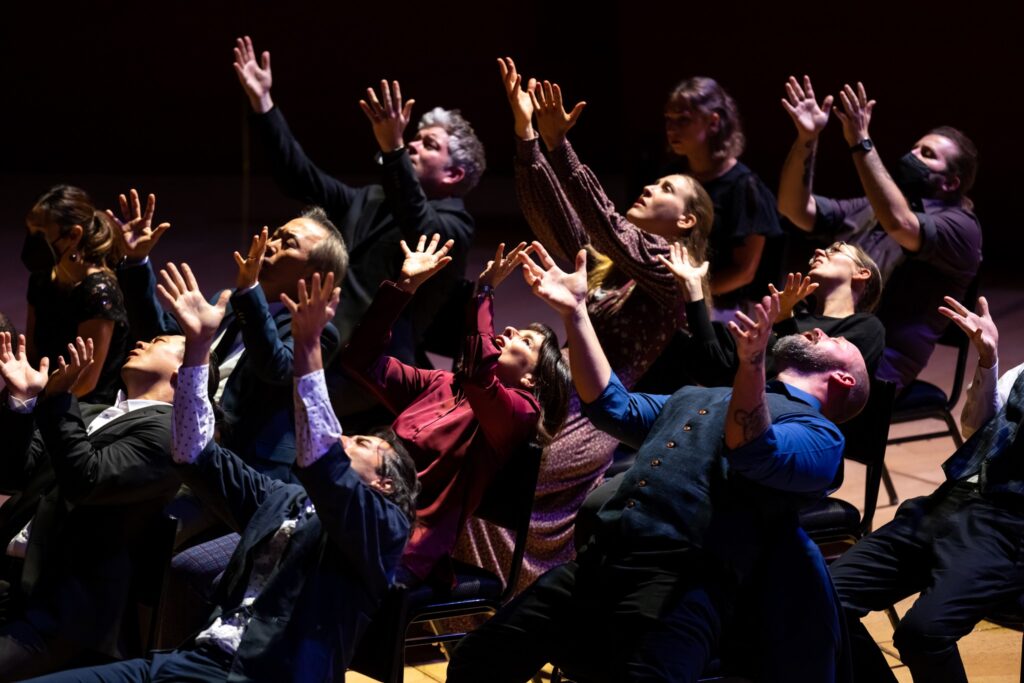
GG: I think it’s really clear, too. It’s not just me and Peter, but it’s everybody in the room. Even though there’s a lot of pain involved there, each one of us is willing to share that for something. For the greater good, as it were.
Speaking of the greater good, these are the two extant pieces with the chorale, Lagrime and Music. Are there any plans for a third piece? Are you able to tell me anything?
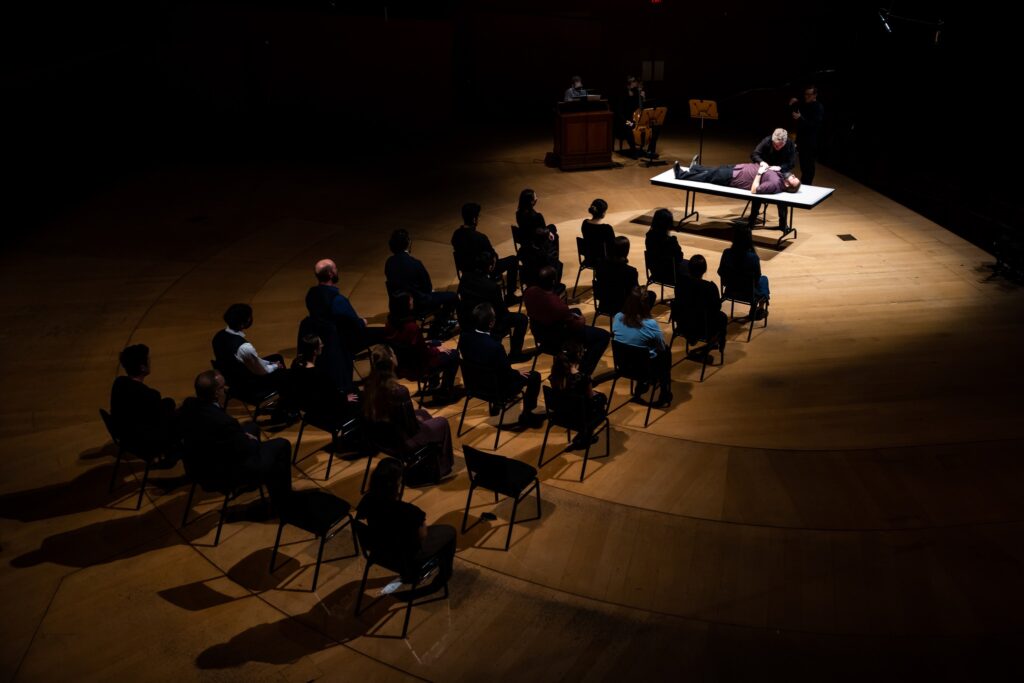
GG: Peter and I have been talking for quite some time about a third piece in what would essentially be a trilogy. Right now, we’re focused on the music of William Byrd, the great Tudor composer and a contemporary of Shakespeare, who lived a long and prolific life and was, of course, active during the period of incredible religious turmoil in England between the new Church of England and the Catholic Church. He was Catholic himself during a time when the Protestants were in power, and it was very dangerous to write music on Catholic liturgy. No promises yet, but that’s definitely where we’re both heading at the moment, and there’s a lot of current context of faith being misused and misunderstood. I’m sworn to secrecy aside from that.